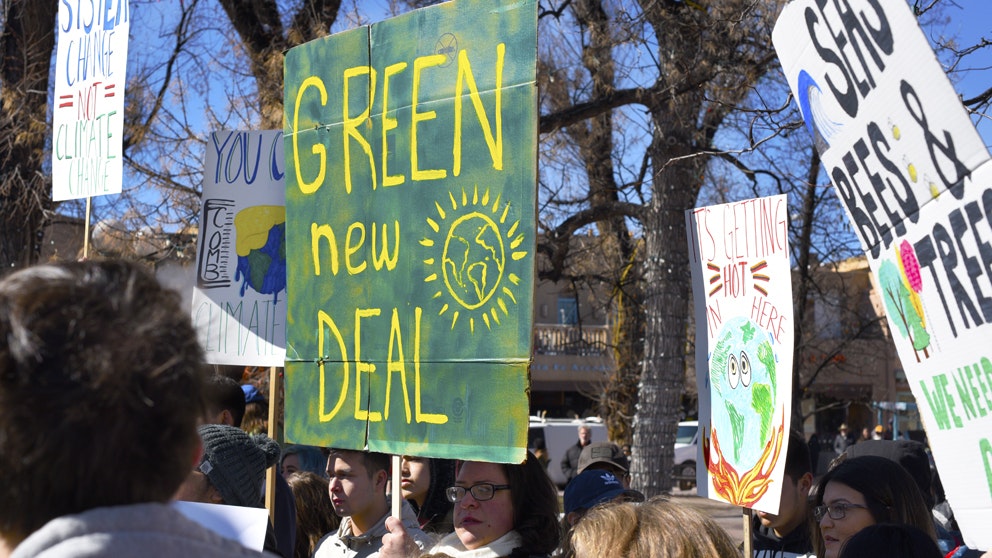A new report from the University of California-Davis takes an honest look at the widespread environmental impacts that will come with a transition to electric vehicles.
The report’s authors form a network called the Climate and Community Project (CCP), which says it “works to connect the demands of the climate justice movement to the policy development process.”
To address these issues, the report proposes a complete social reengineering of society to greatly reduce the need for cars.
The authors’ recommendations follow a line of thinking that some argue is becoming prevalent in environmental and climate change activism that views humans as a problem that needs to be solved.
‘Menace To The Earth?’
The CCP report notes EV batteries require lithium, cobalt, nickel and rare earth minerals.
So, the authors explain, the transition will require large-scale increases in mining resulting in heavy environmental impacts, mostly in poor countries where the mines are found, and increases in greenhouse gas emissions.
Rather than an exploration of the costs and benefits of an electrified transportation system that takes into account there is no perfect solution that provides for abundant automobile transportation free from any environmental impacts, the authors argue people should live in high-density urban environments where they will be free from “car dependency.”
The study’s lead author, Thea Riofrancos, didn’t respond to a Cowboy State Daily request for an interview.
Writing in the Wall Street Journal about the study, Allysia Finley notes the report’s proposals aren’t a fringe idea. A Natural Resource Defense Council report last year that examines the environmental impacts of lithium mining came to similar conclusions.
“Progressives’ ultimate goal is to reduce consumption — and living standards — because they believe humans are a menace to the Earth,” Finley said in her opinion piece.
Short Conservationists
Mara Altman wrote an essay published in The New York Times last month that discusses what she believes is a problem of human height.
In what is likely a facetious proposal, her piece titled “There Has Never Been A Better Time To Be Short” argues that the human race could lower its carbon footprint by encouraging the proliferation of short people.
People of lower stature, the author argues, use fewer resources, including eating less food and drinking less water.
“The short are inherent conservationists, which is more crucial than ever in this world of 8 billion people,” Altman wrote.
So, Altman proposes, people should be mating with small people.
Height Is Complicated
Dr. James Ahern, a biological anthropologist and vice provost of graduate education for the University of Wyoming, told Cowboy State Daily that what determines human height isn’t one thing, such as good nutrition or genetics.
There are more than 400 genes that contribute to how tall a person is, he said.
“Human height itself is kind of interesting,” Ahern explained, “because we think of it as kind of a single morphological feature — a single thing — that we can readily identify, because we look at someone and we see their height relative to ourselves. But human height is actually a combination of a whole bunch of things.”
In other words, a commitment to pairing up with short people might not produce a population of conservationists.
Ahern noted a 2019 study published in the scientific journal PLoS ONE, that reducing human resource consumption is better served by controlling obesity with policies that shift away from energy dense foods that promote it.
Earth’s Cancer
There are more examples of this kind of thinking in mainstream America in which humans are viewed as a cancer on the planet.
In November, The New York Times published a feature on Les Knight, founder of the Voluntary Human Extinction movement, which calls on people to stop reproducing.
Knight, whom the piece compares to the late popular PBS children’s show host Fred Rogers, argues that despite any achievements, humans are a net detriment to the planet.
Prominent climate scientist Michael Mann has said that the world’s carry capacity – a term to mean how many humans it can handle – is only 1 billion. In other words, he wants to see the population of the world population reduced by 7 billion people.
Celebrity primatologist Jane Goodall recently made similar statements.
Long History
Dr. Matt Wielicki, now an assistant professor in the Department of Geological Sciences at the University of Alabama, told Cowboy State Daily it’s especially concerning when westerners are calling for reductions in population since whites are a numerical minority on the planet. So, the bulk of the population reductions would be Asians and Africans.
Wielicki said this line of thinking goes back to Thomas Robert Malthus, an 18th century economist who proposed that unrestricted population growth would lead to catastrophic failures in food supplies leading to widespread famines.
Stanford ecologist Paul Ehrlich argued the same thing in his 1968 book “The Population Bomb.” Rather than increased population growth producing famines and widespread poverty, as Malthus and Ehrich predicted, the opposite happened.
According to the World Bank, the share of the worldwide population that is undernourished fell from 13.2% in 2001 to less than 9% in 2020. Of the global population that is poor, undernourishment rates fell from 37% in 2001 to 29% in 2020.
Data from the World Bank also shows the number of people on the planet living on less than $2.15 per day, based on 2017 prices, fell from 2 billion to fewer than 650 million.
Who Supports Cities?
Knight stressed in The New York Times profile that he doesn’t support mass murder or suicide. Neither Mann nor Goodall has never spoken of any such actions either, but they’ve also never explained exactly how they propose populations be reduced.
In the 1970s, Ehrlich proposed taxes on diapers and children, covert sterilization of the public through drinking water and even spiking foreign food aid with anti-fertility drugs.
Wielicki said there’s always a racial element to this kind of thinking.
“Yet they claim the moral high ground, which is crazy to me,” Wielicki said.
As for the CCP study, Wielicki said it’s inherently anti-rural.
“Do they think these cities are going to magically support themselves?” Wielicki said. “It’s all of the farmers and miners, and all the people that produce all the raw materials that support cities. The world is upside down.”
Wielicki said he believes that, since a lot of their predictions of famine, runaway global warming and poverty turned out to be wrong, today’s activists are ramping up the rhetoric.
“They’re saying the quiet part out loud now. I think they’re running out of time, and they’re running out of the public’s patience. Because the public’s kind of getting fed up with this,” Wielicki said.
Oil Apologists
Gerald Kutney, who describes himself as a commenter on print and social media on the politics of the climate crisis, told Cowboy State Daily the statements by Mann and others about reducing population are being misrepresented.
He said no one’s talking about culling the population.
“I almost find it insulting that people would consider it to be anti-human. This is a phrase that has been used more and more, especially by what I call ‘oil apologists,’” Kutney said.
Kutney said that when members of the scientific community or activists warn people of serious issues, they’re trying to get across a message that humanity is in danger.
“I don’t understand how that’s anti-human. It’s just the opposite,” Kutney said.
Kutney said the point Malthus and Ehrlich were trying to make is that we live on a planet with finite resources.
“The resources on this planet are not going to last forever,” Kutney said.
Trigger Phrase
Kutney acknowledges that the prediction of Malthus and Ehrlich, as far as the timeline, were wrong, but the theories behind them are accurate. So, the predictions will eventually come true, assuming nothing is done to reverse course.
“When will this point be reached? That’s kind of hard to pin down, and there’s different opinions about that,” Kutney said.
The problem is not that we’re running out of resources, Kutney said. That might be the case with some things, but the problem is about environmental sustainability.
“The thing we have to look at is not just running out of resources. It’s how much raping and pillaging of the planet are we going to do,” Kutney said.
The idea that that concept is anti-human, Kutney argues, is “an emotional trigger phrase.”
People who call for this environmental sustainability, Kutney said, “are as humanistic as you can get. The reason they bring this up is not to punish anybody. They have no gain in this.”
Fairy Tales
Wielicki points out that nothing on this planet lives in harmony with the rest of the planet.
To focus on the impacts of one species and decide they’re immoral, while giving all other species a pass, is evidence of the anti-human impulse in environmental and climate activism.
“When a beaver makes a dam and kills 100 groundhogs that had their homes in the area,” Wielicki said, “it’s not in harmony with the environment around it.”
He said that the idea of humans living in harmony with nature is a “fairy tale” that’s told to push political agendas.
He points to wind energy in Wyoming and the problem of landfills filling up with wind turbine blades, impacts to eagles and a host of other issues that come out of what’s supposed to be a less impactful form of energy.
“You’re always going to have an impact,” he said. “It’s good to think about those impacts and to mitigate those impacts.
“But this fairy tale that somehow we’re going to have no impact and be in harmony with nature? It’s just crazy.”





